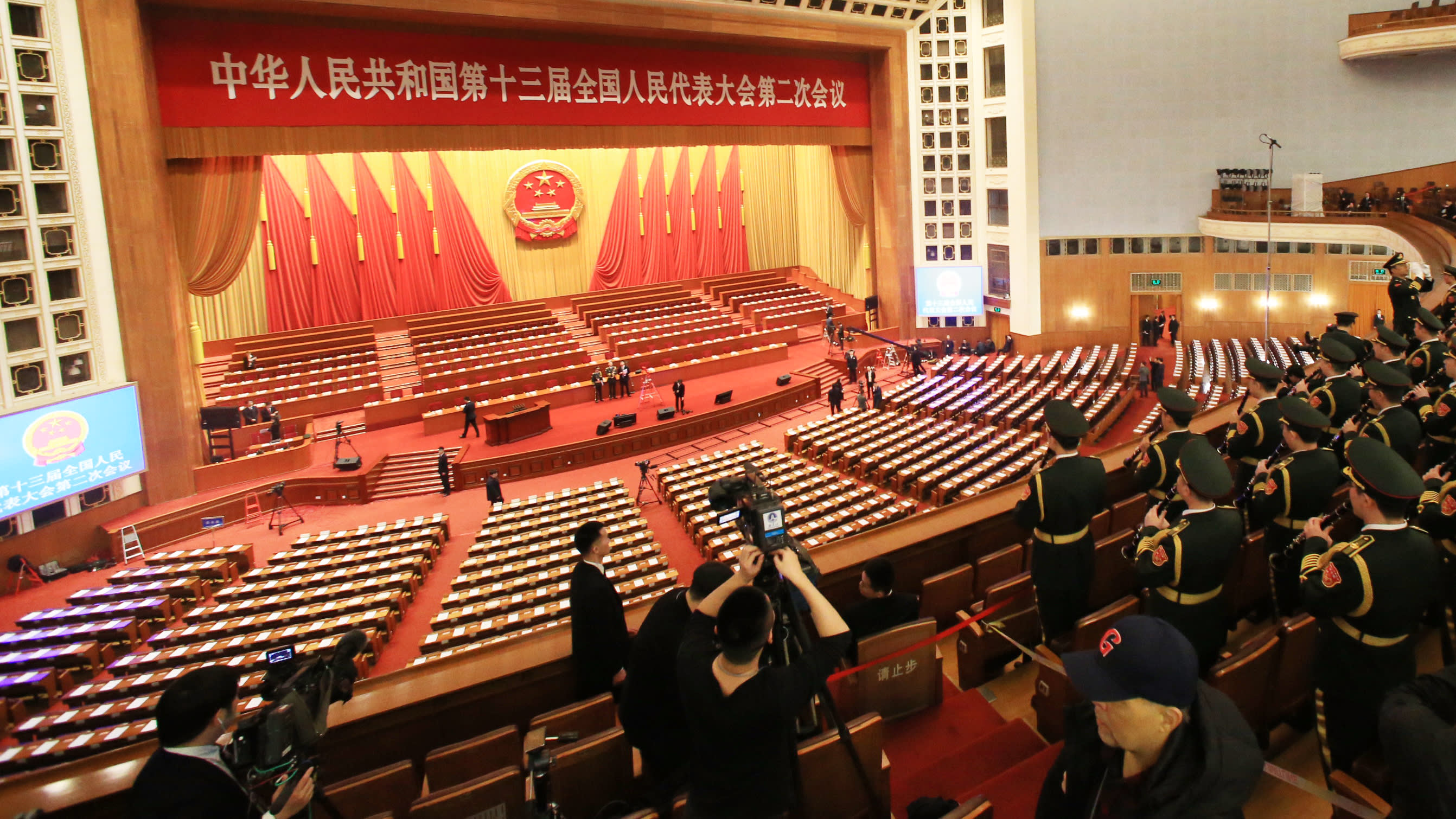Nominally the highest organ of state power in China, the NPC is typically regarded as a "rubber-stamp parliament" since it very rarely rejects government bills and has never failed to approve a work report by the government.
NPC meetings have only been deferred three times before in the 70-year history of the People's Republic of China. These have typically occurred during times of great political upheaval, such as the "anti-rightest" purges of 1957 and the famine-inducing Great Leap Forward in 1959.
Covid-19, the disease caused by the coronavirus infection, has killed almost 2,600 people in China since the pandemic originated in the city of Wuhan in December last year.
On Monday, Chinese health authorities confirmed a total of 77,152 cases nationwide, with the National Health Commission reporting 409 new cases of infection. Another 150 deaths were reported, a new daily record.
A total of 149 of the new deaths and 398 of the new infections occurred within Hubei province, where Wuhan is situated.
The government of Wuhan on Monday announced a relaxation of a city-wide lockdown, before later rescinding the statement.
A post by the municipal government said the earlier announcement had been made by traffic controllers without permission from central leaders or the disease control command centre.
Despite the high number of fatalities and ongoing outbreaks worldwide, official statistics point to a slowdown in the spread of the virus within China.
However, a growing outbreak is causing alarm in South Korea, where a seventh death from the novel coronavirus was announced on Monday by the Korea Centers for Disease Control and Prevention (KCDC).
The number of infections there has risen by 161, bringing the total number to 763.
Many of the new South Korean cases are linked to a hospital (110) and to a religious group called the Shincheonji church of Jesus (129) near the south-eastern city of Daegu, authorities said.
Five of the seven deaths are believed to be linked to the hospital, which has been isolated to halt the further spread of the virus.
The city of Daegu and the nearby county of Cheongdo, where the hospital is located, have been declared "special care zones."
Nine medical staff at Daenam Hospital have also been confirmed to be infected with Covid-19.
Taiwan on Monday issued an official travel alert for South Korea, urging its citizens to avoid all non-essential travel there.
Taiwanese Health and Welfare Minister Chen Shih-chung said all Taiwanese nationals currently in South Korea would be asked to undergo 14 days at home in quarantine if they return to Taiwan after midnight on Thursday (1600 GMT on Wednesday).
As of Monday, Taiwan has reported 30 confirmed cases, including one death. Five patients have so far recovered and been discharged from hospitals, according to Taiwan's Central Epidemic Command Centre (CECC).
Japan confirmed more cases of the novel coronavirus on Monday, including a quarantine worker and a health ministry official assigned to a ship in Yokohama, raising the total number of infections in the country to 844, including four deaths.
The figure includes 691 people who were on the Diamond Princess cruise ship, which was quarantined for two weeks.
Cases of the virus have also been recorded in 28 countries worldwide, killing 17 people and infecting over 1,700 others outside of China, according to the latest data from the World Health Organization (WHO).
In a speech on Sunday, Chinese president Xi Jinping underscored the importance of preventing the infection from spreading further in Beijing, calling the protection of the capital one of the country's top two strategic goals.
NPC meetings have only been deferred three times before in the 70-year history of the People's Republic of China. These have typically occurred during times of great political upheaval, such as the "anti-rightest" purges of 1957 and the famine-inducing Great Leap Forward in 1959.
Covid-19, the disease caused by the coronavirus infection, has killed almost 2,600 people in China since the pandemic originated in the city of Wuhan in December last year.
On Monday, Chinese health authorities confirmed a total of 77,152 cases nationwide, with the National Health Commission reporting 409 new cases of infection. Another 150 deaths were reported, a new daily record.
A total of 149 of the new deaths and 398 of the new infections occurred within Hubei province, where Wuhan is situated.
The government of Wuhan on Monday announced a relaxation of a city-wide lockdown, before later rescinding the statement.
A post by the municipal government said the earlier announcement had been made by traffic controllers without permission from central leaders or the disease control command centre.
Despite the high number of fatalities and ongoing outbreaks worldwide, official statistics point to a slowdown in the spread of the virus within China.
However, a growing outbreak is causing alarm in South Korea, where a seventh death from the novel coronavirus was announced on Monday by the Korea Centers for Disease Control and Prevention (KCDC).
The number of infections there has risen by 161, bringing the total number to 763.
Many of the new South Korean cases are linked to a hospital (110) and to a religious group called the Shincheonji church of Jesus (129) near the south-eastern city of Daegu, authorities said.
Five of the seven deaths are believed to be linked to the hospital, which has been isolated to halt the further spread of the virus.
The city of Daegu and the nearby county of Cheongdo, where the hospital is located, have been declared "special care zones."
Nine medical staff at Daenam Hospital have also been confirmed to be infected with Covid-19.
Taiwan on Monday issued an official travel alert for South Korea, urging its citizens to avoid all non-essential travel there.
Taiwanese Health and Welfare Minister Chen Shih-chung said all Taiwanese nationals currently in South Korea would be asked to undergo 14 days at home in quarantine if they return to Taiwan after midnight on Thursday (1600 GMT on Wednesday).
As of Monday, Taiwan has reported 30 confirmed cases, including one death. Five patients have so far recovered and been discharged from hospitals, according to Taiwan's Central Epidemic Command Centre (CECC).
Japan confirmed more cases of the novel coronavirus on Monday, including a quarantine worker and a health ministry official assigned to a ship in Yokohama, raising the total number of infections in the country to 844, including four deaths.
The figure includes 691 people who were on the Diamond Princess cruise ship, which was quarantined for two weeks.
Cases of the virus have also been recorded in 28 countries worldwide, killing 17 people and infecting over 1,700 others outside of China, according to the latest data from the World Health Organization (WHO).
In a speech on Sunday, Chinese president Xi Jinping underscored the importance of preventing the infection from spreading further in Beijing, calling the protection of the capital one of the country's top two strategic goals.









 Home
Home Politics
Politics











